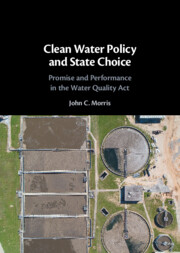Book contents
- Clean Water Policy and State Choice
- Clean Water Policy and State Choice
- Copyright page
- Dedication
- Epigraph
- Contents
- Figures
- Tables
- Foreword
- Acknowledgments
- Abbreviations
- Introduction
- 1 Setting the Stage
- 2 Reagan Federalism, States’ Rights, and the Revolving Loan Fund Model
- 3 The Foundations of Water Quality Policy in the United States
- 4 Expansion and Contraction in the Federal Role in Water Quality Policy
- 5 Features of the Water Quality Act of 1987
- 6 A Model of State Implementation of the Clean Water State Revolving Fund Program
- 7 Initial State Implementation of the Revolving Loan Fund Model
- 8 Implementation “On the Ground”
- 9 The Distributional Impacts of the CWSRF
- 10 Promise and Performance
- Book part
- About the Author
- Notes
- References
- Index
1 - Setting the Stage
Clean Water, Federal Policy Goals, and State Choice
Published online by Cambridge University Press: 10 March 2022
- Clean Water Policy and State Choice
- Clean Water Policy and State Choice
- Copyright page
- Dedication
- Epigraph
- Contents
- Figures
- Tables
- Foreword
- Acknowledgments
- Abbreviations
- Introduction
- 1 Setting the Stage
- 2 Reagan Federalism, States’ Rights, and the Revolving Loan Fund Model
- 3 The Foundations of Water Quality Policy in the United States
- 4 Expansion and Contraction in the Federal Role in Water Quality Policy
- 5 Features of the Water Quality Act of 1987
- 6 A Model of State Implementation of the Clean Water State Revolving Fund Program
- 7 Initial State Implementation of the Revolving Loan Fund Model
- 8 Implementation “On the Ground”
- 9 The Distributional Impacts of the CWSRF
- 10 Promise and Performance
- Book part
- About the Author
- Notes
- References
- Index
Summary
The congressional framers of the Water Quality act of 1987 laid out specific expectation for the uses for federal funds authorized in the legislation, as well as expectations regarding the kinds of communities that would be served by the infrastructure program in the legislation. This chapter discusses the larger question of water pollution control, including challenges to effective pollution control policies. In addition, the chapter introduces the underlying research questions for the research, and explains why water pollution control policy is worthy of government attention. The chapter also makes a case for why the WQA is particularly interesting in this regard, and provides a brief description of the block grant program that provides funds for water quality infrastructure, the Clean Water State Revolving Fund program. Finally, the chapter discusses the tensions between environmental and financial goals that are inherent in the revolving loan fund policy instrument.
- Type
- Chapter
- Information
- Clean Water Policy and State ChoicePromise and Performance in the Water Quality Act, pp. 7 - 29Publisher: Cambridge University PressPrint publication year: 2022

